Design is a thought activity: we should not replace it with a mere “optimizing” approach, because it’s from imperfections that talent emerges.

Last month the European Court of Auditors published a special report titled “Efforts to address problems with public procurement in EU cohesion expenditure should be intensified”, showing how EU funds are wasted as a result of errors or misreporting. According to this report, at the beginning of the year 12 EU countries had not fulfilled public procurement conditions demanded by EU law: some of these are the same countries with a low ranking in the EU on Transparency’s annual Corruption Perceptions Index.
The most significant and serious errors identified by the report concern the direct award of a contract without a public tender or the illegal selection of a company and they amount to 168. ECA’s report denounces both the Commission and Member States for lacking appropriate controls on the entire procurement cycle, which are essential in order to prevent EU funds from being lost to bribery or mismanagement.
To this purpose, Transparency International and the European Commission have already established Integrity Pacts in different Member States, stating that companies taking part in the tendering process commit to abstain from bribery and other corrupt practices during the execution of a contract. Integrity Pacts thus represent a further effort from TI and the European Commission to ensure transparency and stop public money going to waste.